The Automotive Valves Market is estimated to be valued at USD 24.1 billion in 2025 and is projected to reach USD 32.4 billion by 2035, registering a compound annual growth rate (CAGR) of 3.0% over the forecast period. This moderate trajectory highlights a technology-driven market where efficiency, durability, and regulatory compliance guide demand patterns across regions. Contribution analysis by technology reveals a multi-layered competitive landscape where advancements in engine design and propulsion systems influence valve integration. Traditional technologies such as mechanical valves continue to dominate early in the forecast period, supported by their cost-effectiveness and compatibility with internal combustion engine platforms. Their contribution gradually declines as stricter emission standards and vehicle electrification reshape requirements.
By the mid-forecast period, lightweight materials and improved thermal resistance in mechanical designs sustain relevance, though at a reduced share. Electronic and variable valve timing technologies contribute increasingly to market growth, driven by the demand for fuel efficiency and optimized performance. Their ability to enhance airflow management and reduce emissions ensures stronger adoption in both passenger and commercial vehicles. The integration of valves in hybrid and alternative fuel vehicles expands, as manufacturers adopt smart and adaptive technologies to balance efficiency with regulatory pressure. While the market grows steadily, the value distribution shifts toward advanced valve systems that complement electrification and efficiency trends.
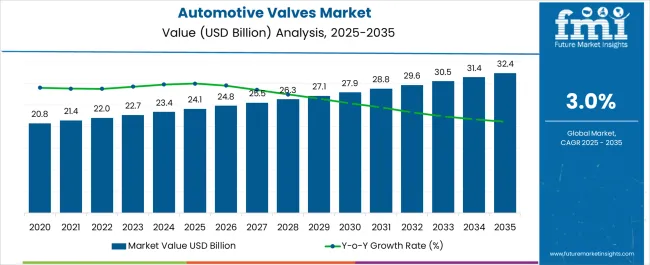
| Metric | Value |
|---|---|
| Automotive Valves Market Estimated Value in (2025 E) | USD 24.1 billion |
| Automotive Valves Market Forecast Value in (2035 F) | USD 32.4 billion |
| Forecast CAGR (2025 to 2035) | 3.0% |
The automotive valves market is experiencing robust growth supported by the sustained demand for fuel efficient vehicles, ongoing internal combustion engine production, and technological improvements in valve train systems. Advancements in material durability, heat resistance, and precision manufacturing are enhancing the performance and longevity of automotive valves across engine systems.
Regulatory norms focusing on emissions control are pushing manufacturers to develop valves that ensure optimal combustion and reduced pollutant discharge. Moreover, the continuous expansion of automotive fleets, especially in developing economies, is contributing to volume demand.
Even with the rise of electrification trends, the market remains buoyed by the dominance of internal combustion engine platforms across passenger and commercial vehicle segments. As a result, the outlook for automotive valves remains positive, driven by durability standards, mechanical efficiency, and evolving design integrations.
The automotive valves market is segmented by valve type, vehicle type, application, technology, sales channel, and geographic regions. By valve type, the automotive valves market is divided into Engine valves, Fuel Injection Valves, Emission Control Valves, Braking System Valves, Cooling System Valves, Transmission System Valves, Battery valves, and Solenoid valves. In terms of vehicle type, the automotive valves market is classified into Two-wheelers, Passenger cars, and Commercial vehicles.
Based on the application, the automotive valves market is segmented into ICE and EV. The automotive valves market is segmented by technology into Hydraulic Valves, Pneumatic Valves, Electric Valves, and Others. By sales channel, the automotive valves market is segmented into OEM and Aftermarket. Regionally, the automotive valves industry is classified into North America, Latin America, Western Europe, Eastern Europe, Balkan & Baltic Countries, Russia & Belarus, Central Asia, East Asia, South Asia & Pacific, and the Middle East & Africa.
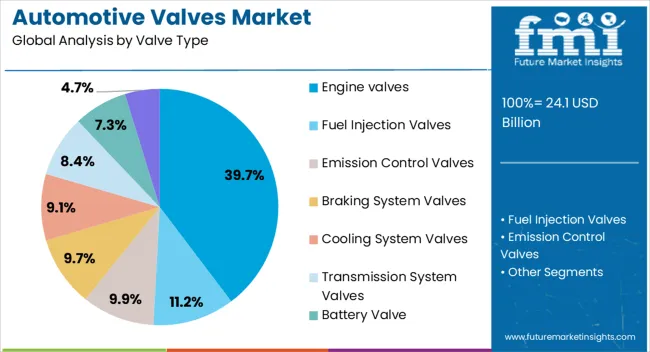
The engine valves segment is projected to account for 39.70% of total revenue by 2025 under the valve type category, establishing it as the leading segment. Its dominance is attributed to its critical role in controlling intake and exhaust flow in combustion engines, directly impacting fuel efficiency and engine performance.
Increased production of petrol and diesel engines, especially in emerging markets, has supported volume demand. Ongoing enhancements in multi-valve technologies and variable valve timing systems have further expanded the relevance of engine valves in modern vehicle architectures.
Additionally, their requirement in both passenger and heavy-duty vehicles reinforces their stronghold across the automotive manufacturing ecosystem.
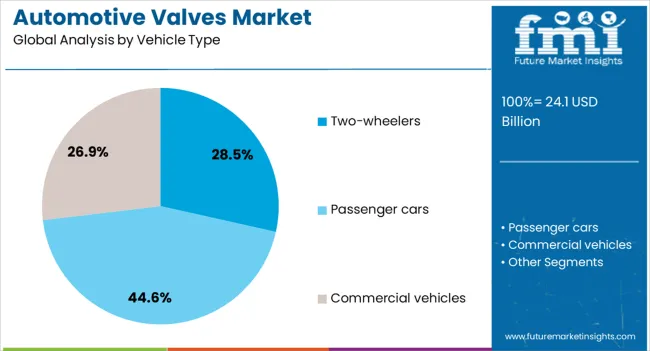
Two-wheelers are anticipated to contribute 28.50% of the overall market share within the vehicle type category by 2025. The high penetration of two-wheelers in densely populated regions, particularly across the Asia Pacific, supports consistent demand for cost-effective and durable valve systems.
Lightweight design, frequent usage, and affordability of two-wheelers have driven manufacturers to focus on efficient valve configurations that ensure smooth power delivery and low maintenance. Urban mobility preferences and increasing adoption of personal transportation for last-mile connectivity continue to reinforce growth for this segment.
As vehicle ownership in emerging economies rises, two-wheelers will remain a central contributor to the automotive valves market.
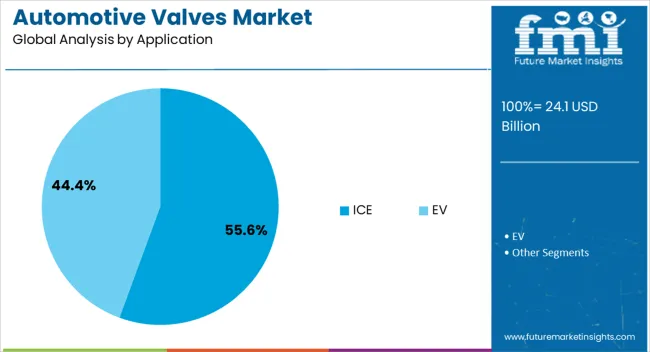
The internal combustion engine segment is expected to hold 55.60% of the total revenue share by 2025 within the application category, maintaining its leadership position. Despite the gradual shift toward electrification, ICE-powered vehicles remain the mainstream option for both commercial and personal transport, especially in cost-sensitive markets.
The complexity of combustion processes demands reliable valve systems to manage thermal efficiency and emission control. Technological innovation aimed at reducing fuel consumption and meeting stringent emission norms continues to support valve replacement and upgrade cycles.
With ICE platforms still dominating vehicle production globally, the application of automotive valves in this segment is expected to remain strong in the medium term.
The market has been shaped by technological upgrades in engine design, emission control requirements, and the rising integration of advanced vehicle systems. Valves have been critical in regulating the flow of fuel, air, and exhaust gases within engines, thereby influencing efficiency, performance, and compliance with global standards. The market has been influenced by both internal combustion engine demand and the evolution of hybrid vehicle platforms. With ongoing regulatory shifts and customer expectations, the role of precision-engineered valves has been increasingly emphasized.
The automotive valves market has been driven significantly by the rising need for vehicles to meet stricter emission standards while maintaining high performance. Valves controlling exhaust gas recirculation, variable valve timing, and intake systems have been designed to optimize combustion and reduce harmful gases. Automakers have been adopting advanced valve technologies such as variable valve lift and electronic actuation to enhance fuel economy. Regulations in Europe, North America, and Asia have accelerated this trend, as compliance with Euro 6 and similar standards has required improved valve performance. This focus on balancing efficiency with emission reduction has kept the demand for innovative valve designs strong.
Hybrid vehicles and alternative fuel technologies have contributed to shaping the automotive valves market. Valves have been required for applications not only in conventional engines but also in systems supporting battery cooling, thermal management, and compressed natural gas or hydrogen storage. Hybrid vehicles have demanded higher precision valves to ensure seamless switching between combustion and electric modes. While full electric vehicles reduce reliance on traditional engine valves, auxiliary systems still require valve technologies for fluid and gas regulation. This diversification of applications has safeguarded demand for valves, even as the automotive industry transitions towards electrification.
The market for automotive valves has been influenced by continuous improvements in materials, coatings, and electronic integration. Lightweight alloys and heat-resistant coatings have been utilized to enhance durability under extreme conditions. The introduction of electronically controlled valves has allowed greater precision compared to traditional mechanical systems, leading to improved engine responsiveness and lower emissions. Manufacturers have been investing in research to reduce friction and extend valve life cycles, thereby lowering maintenance costs. These innovations have supported adoption across both passenger and commercial vehicles, where reliability and long-term performance have been viewed as critical purchase considerations.
Challenges in the automotive valves market have emerged from pricing pressures and the shift towards electric mobility. With automakers aiming to lower production costs, suppliers have faced pressure to deliver advanced valves at competitive pricing. Additionally, the growth of fully electric vehicles, which do not require traditional combustion engine valves, has been a long-term concern for demand. While hybrid and auxiliary applications provide some balance, the reliance on ICE-heavy markets remains a limitation. Market players have responded by diversifying product portfolios and exploring opportunities in thermal and fluid control systems to remain relevant in an evolving automotive landscape.
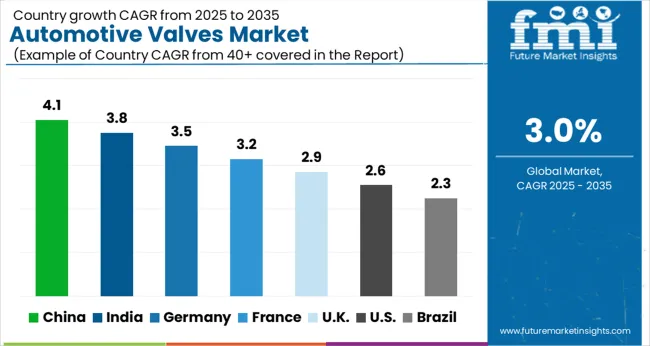
| Countries | CAGR |
|---|---|
| China | 4.1% |
| India | 3.8% |
| Germany | 3.5% |
| France | 3.2% |
| UK | 2.9% |
| USA | 2.6% |
| Brazil | 2.3% |
The market is forecast to expand at a CAGR of 3.0% between 2025 and 2035, shaped by evolving engine technologies and increasing vehicle production. China is projected at 4.1%, driven by strong domestic automotive manufacturing and exports. India follows with 3.8%, supported by rising passenger vehicle demand and local component production. Germany stands at 3.5%, reflecting advanced engineering and integration of efficient valve technologies in premium vehicles. The UK records 2.9%, influenced by demand in light commercial vehicles and aftermarket segments. The US remains steady at 2.6%, supported by high vehicle ownership rates and technological innovation in valve systems. This report includes insights on 40+ countries; the top markets are shown here for reference.
China is projected to remain the largest market for automotive valves with a CAGR of 4.1% during the forecast period. Expansion of automotive production facilities and increasing demand for passenger and commercial vehicles support market growth. Stricter emission regulations are driving the adoption of advanced valve technologies including exhaust gas recirculation and variable valve timing systems. Rising exports and investment in lightweight, high-precision components strengthen China’s position as a hub for valve manufacturing catering to both domestic and international demand.
India is expected to grow at a CAGR of 3.8% due to rising automotive output and a large two-wheeler and compact car segment. Regulatory pressures on emissions and consumer focus on fuel efficiency are encouraging the use of advanced valve technologies. Partnerships between local and global manufacturers are increasing production capabilities. Exports are gaining importance as India becomes a cost-efficient hub for automotive components, while aftermarket demand remains robust owing to one of the largest vehicle fleets globally.
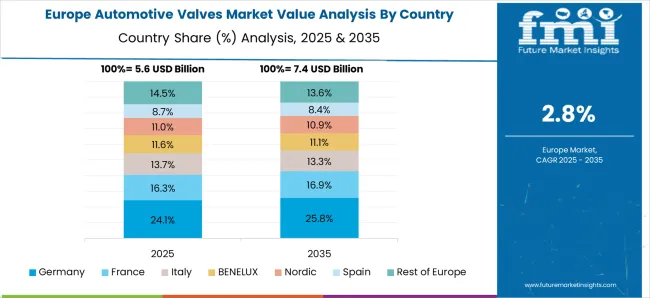
Germany is anticipated to record a CAGR of 3.5% with strong demand from premium and high-performance vehicles. Advanced valve technologies are increasingly adopted to enhance fuel efficiency, durability, and emission compliance. Focus on high-quality materials and engineering excellence supports innovations in valve timing, exhaust management, and lightweight components. Hybrid vehicle adoption further influences market trends. Germany continues to set benchmarks in precision valve technology for Europe and global markets.
The United Kingdom is forecasted to grow at a CAGR of 2.9%, supported by steady demand in passenger car production and a mature aftermarket. Automakers are introducing lightweight valves to improve fuel efficiency and meet emission standards. Aftermarket replacement demand is significant due to a large vehicle parc. Hybrid and electric vehicle adoption is gradually shaping design priorities, emphasizing advanced thermal and fluid management. Suppliers are focusing on precision manufacturing, cost optimization, and regulatory compliance.
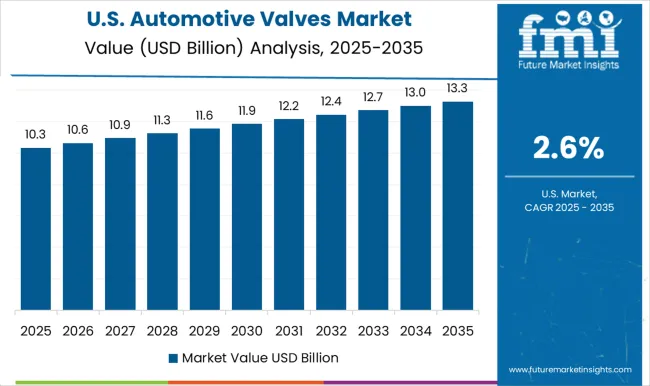
The United States is projected to expand at a CAGR of 2.6%. Light trucks and SUVs dominate demand while mature aftermarket sales provide continuous opportunities. Stricter fuel efficiency and emission regulations are driving the integration of variable timing and emission control valves. Domestic and international suppliers are investing in innovation and supply chain resilience. Consumer preference for durable and efficient vehicles supports adoption of advanced valve technologies.

The market is witnessing notable expansion as demand for advanced vehicle systems and emission control technologies grows worldwide. Aisin Seiki and Denso hold a strong position with extensive expertise in powertrain components and thermal management solutions, ensuring efficiency and compliance with global regulations. Bosch and Continental lead through innovative valve technologies integrated into braking and engine management systems, enabling higher fuel efficiency and reduced emissions. BorgWarner continues to emphasize turbocharging and exhaust gas recirculation systems, which are critical for optimizing vehicle performance.
Hitachi and Magna International contribute significantly by supplying electronically controlled valves and transmission components that improve drivability and reliability. Mahle and Tenneco strengthen their presence by focusing on precision-engineered valves that enhance combustion efficiency and extend engine life. Wabco, now part of ZF, plays a crucial role in the development of air and pneumatic valves for braking and suspension systems, particularly in commercial vehicles. Collectively, these providers drive market competitiveness by developing lightweight, durable, and electronically integrated valve technologies. Their focus on innovation, compliance with emission norms, and adaptation to hybrid and electric vehicle architectures ensures the continued relevance of valves across evolving mobility platforms. The combined strategies of these companies reinforce the automotive valves market as an essential segment supporting efficiency, safety, and sustainability in modern transportation.
| Item | Value |
|---|---|
| Quantitative Units | USD 24.1 Billion |
| Valve Type | Engine valves, Fuel Injection Valves, Emission Control Valves, Braking System Valves, Cooling System Valves, Transmission System Valves, Battery Valve, and Solenoid Valve |
| Vehicle Type | Two-wheelers, Passenger cars, and Commercial vehicles |
| Application | ICE and EV |
| Technology | Hydraulic Valves, Pneumatic Valves, Electric Valves, and Others |
| Sales Channel | OEM and Aftermarket |
| Regions Covered | North America, Europe, Asia-Pacific, Latin America, Middle East & Africa |
| Country Covered | United States, Canada, Germany, France, United Kingdom, China, Japan, India, Brazil, South Africa |
| Key Companies Profiled | Aisin Seiki, Borgwarner, Bosch, Continental, Denso, Hitachi, Magna International, Mahle, Tenneco, and Wabco |
| Additional Attributes | Dollar sales by valve type and vehicle category, demand dynamics across passenger and commercial vehicles, regional trends in automotive manufacturing hubs, innovation in lightweight materials and electronic integration, environmental impact of emissions control and recycling, and emerging use cases in hybrid and electric vehicle systems. |
The global automotive valves market is estimated to be valued at USD 24.1 billion in 2025.
The market size for the automotive valves market is projected to reach USD 32.4 billion by 2035.
The automotive valves market is expected to grow at a 3.0% CAGR between 2025 and 2035.
The key product types in automotive valves market are engine valves, fuel injection valves, emission control valves, braking system valves, cooling system valves, transmission system valves, battery valve and solenoid valve.
In terms of vehicle type, two-wheelers segment to command 28.5% share in the automotive valves market in 2025.






Our Research Products

The "Full Research Suite" delivers actionable market intel, deep dives on markets or technologies, so clients act faster, cut risk, and unlock growth.

The Leaderboard benchmarks and ranks top vendors, classifying them as Established Leaders, Leading Challengers, or Disruptors & Challengers.

Locates where complements amplify value and substitutes erode it, forecasting net impact by horizon

We deliver granular, decision-grade intel: market sizing, 5-year forecasts, pricing, adoption, usage, revenue, and operational KPIs—plus competitor tracking, regulation, and value chains—across 60 countries broadly.

Spot the shifts before they hit your P&L. We track inflection points, adoption curves, pricing moves, and ecosystem plays to show where demand is heading, why it is changing, and what to do next across high-growth markets and disruptive tech

Real-time reads of user behavior. We track shifting priorities, perceptions of today’s and next-gen services, and provider experience, then pace how fast tech moves from trial to adoption, blending buyer, consumer, and channel inputs with social signals (#WhySwitch, #UX).

Partner with our analyst team to build a custom report designed around your business priorities. From analysing market trends to assessing competitors or crafting bespoke datasets, we tailor insights to your needs.
Supplier Intelligence
Discovery & Profiling
Capacity & Footprint
Performance & Risk
Compliance & Governance
Commercial Readiness
Who Supplies Whom
Scorecards & Shortlists
Playbooks & Docs
Category Intelligence
Definition & Scope
Demand & Use Cases
Cost Drivers
Market Structure
Supply Chain Map
Trade & Policy
Operating Norms
Deliverables
Buyer Intelligence
Account Basics
Spend & Scope
Procurement Model
Vendor Requirements
Terms & Policies
Entry Strategy
Pain Points & Triggers
Outputs
Pricing Analysis
Benchmarks
Trends
Should-Cost
Indexation
Landed Cost
Commercial Terms
Deliverables
Brand Analysis
Positioning & Value Prop
Share & Presence
Customer Evidence
Go-to-Market
Digital & Reputation
Compliance & Trust
KPIs & Gaps
Outputs
Full Research Suite comprises of:
Market outlook & trends analysis
Interviews & case studies
Strategic recommendations
Vendor profiles & capabilities analysis
5-year forecasts
8 regions and 60+ country-level data splits
Market segment data splits
12 months of continuous data updates
DELIVERED AS:
PDF EXCEL ONLINE
Automotive Direct Liquid Cooling IGBT Module Market Size and Share Forecast Outlook 2025 to 2035
Automotive Hoses and Assemblies Market Size and Share Forecast Outlook 2025 to 2035
Automotive Network Testing Market Size and Share Forecast Outlook 2025 to 2035
Automotive Performance Part Market Size and Share Forecast Outlook 2025 to 2035
Automotive Carbon Ceramic Brake Market Size and Share Forecast Outlook 2025 to 2035
Automotive Camshaft Market Size and Share Forecast Outlook 2025 to 2035
Automotive Stamping Industry Analysis in India Size and Share Forecast Outlook 2025 to 2035
Automotive Cylinder Liner Market Size and Share Forecast Outlook 2025 to 2035
Automotive Microcontroller Market Size and Share Forecast Outlook 2025 to 2035
Automotive Roof Rails Market Size and Share Forecast Outlook 2025 to 2035
Automotive Active Safety System Market Size and Share Forecast Outlook 2025 to 2035
Automotive Diagnostic Scan Tool Market Size and Share Forecast Outlook 2025 to 2035
Automotive Test Equipment Market Size and Share Forecast Outlook 2025 to 2035
Automotive Dynamic Map Data Market Size and Share Forecast Outlook 2025 to 2035
Automotive Green Tires Market Size and Share Forecast Outlook 2025 to 2035
Automotive E-Tailing Market Size and Share Forecast Outlook 2025 to 2035
Automotive Interior Market Forecast Outlook 2025 to 2035
Automotive Key Market Size and Share Forecast Outlook 2025 to 2035
Automotive Appearance Chemical Market Forecast and Outlook 2025 to 2035
Automotive Seating Market Forecast and Outlook 2025 to 2035

Thank you!
You will receive an email from our Business Development Manager. Please be sure to check your SPAM/JUNK folder too.
Chat With
MaRIA